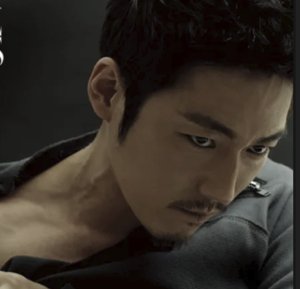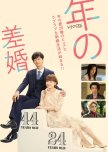Age Gap Marriage
Toshi no Sakon, which literally translates to age gap marriage, struck me with its cinematography. It's beautifully shot, and I liked how vague the first five minutes about the identity of Murakami Maiko's (Aoi Wakana) husband were. I found some elements of the show refreshing, despite some other elements being a typical Japanese rom-com genre where a sheltered female who has never been in a relationship meets a handsome young man falls in love and end of story.
Toshi no Sakon is different in that things happen in reverse. The sheltered girl is more or less forced to go on an arranged marriage matchmaking session. When she meets her match, she instinctively attracted to him and his agreeable nature despite the huge age difference. He, Hanasato Harumi (Takezai Terunosuke), who decides to only meet her to appease his client Murakami Genichiro (Fukikoshi Mitsuru) Maiko's father, is taken by her forwardness, and before we know it, they are married. And this is when the story begins.
I liked Maiko as a character, and Aoi Wakana for her ability to portray Makio in a way that made me believe in her sincerity, innocence and maturity despite her young age, and for boldly pursuing her heart's desire in a culture where one, especially a female, isn't always open about their emotions. She even initiatives the first kiss before their third date, and practically proposes to him. But I enjoyed most about her loudly expressing her inner voice, which is probably what endeared her to Harumi for being the complete opposite of him. As for Harumi, I admired his honesty and how amiable he was to Maiko despite being much older, and more set in his ways, how intrigued he was both physically and mentally. I can't even say it was simply opposites attracted, it was much more than that. It was like the old age meeting the new age and forming an intergenerational connection that's bounded by the differences rather than pulled apart.
I think if Toshi no Sakon had just stopped at that, it would have been your average rom-com with an age gap. But the fact that it dived into the fears and insecurities Maiko faces in her inexperienced love versus Harumi experienced one, and his insecurity with his age and fear of not being able to compete, and the very realistic way the show addresses those insecurities from the Japanese presepctive, is what made Toshi no Sakon stand out even if from my cultural standpoint I may not have understood but that's okay since the show was not for my perspective I still liked and respected the options and directions it takes. The trail and tribulations Maiko and Harumi face as they attempt to measure up to what they each believe are their shortcomings, and the ways the drama tackles and addresses those trials in age, societal and cultural differences, terminology, not only from the perspective of an older man and younger woman, but also from the perspective of an older woman and younger man, and how the intergenerational gap experience despite being the same affects men and women of the same age differently.
The message Toshi no Sakon is so simple -- open dialogue is essential for experiencing, expressing and fostering love in marriage. Despite men and women, be they younger or older, acting differently and communicating in different ways, be in tone or attitude, the need to develop certain attitudes that express love and encourage authentic dialogue is key. Often spouses regardless of age aren't necessarily looking for their other half to find a resolution, they simply want to know their partner is paying attention to them, and acknowledges their fears, and insecurities. And most importantly, not to let societal or cultural differences be they in age or otherwise to limit them or dictate their happiness, because the combination of two different ways of thinking rather than hinder can be the source that elevates them to the next level of their co-existence and ultimately their happiness. Highly recommended, I enjoyed this short but very sweet drama.
Toshi no Sakon is different in that things happen in reverse. The sheltered girl is more or less forced to go on an arranged marriage matchmaking session. When she meets her match, she instinctively attracted to him and his agreeable nature despite the huge age difference. He, Hanasato Harumi (Takezai Terunosuke), who decides to only meet her to appease his client Murakami Genichiro (Fukikoshi Mitsuru) Maiko's father, is taken by her forwardness, and before we know it, they are married. And this is when the story begins.
I liked Maiko as a character, and Aoi Wakana for her ability to portray Makio in a way that made me believe in her sincerity, innocence and maturity despite her young age, and for boldly pursuing her heart's desire in a culture where one, especially a female, isn't always open about their emotions. She even initiatives the first kiss before their third date, and practically proposes to him. But I enjoyed most about her loudly expressing her inner voice, which is probably what endeared her to Harumi for being the complete opposite of him. As for Harumi, I admired his honesty and how amiable he was to Maiko despite being much older, and more set in his ways, how intrigued he was both physically and mentally. I can't even say it was simply opposites attracted, it was much more than that. It was like the old age meeting the new age and forming an intergenerational connection that's bounded by the differences rather than pulled apart.
I think if Toshi no Sakon had just stopped at that, it would have been your average rom-com with an age gap. But the fact that it dived into the fears and insecurities Maiko faces in her inexperienced love versus Harumi experienced one, and his insecurity with his age and fear of not being able to compete, and the very realistic way the show addresses those insecurities from the Japanese presepctive, is what made Toshi no Sakon stand out even if from my cultural standpoint I may not have understood but that's okay since the show was not for my perspective I still liked and respected the options and directions it takes. The trail and tribulations Maiko and Harumi face as they attempt to measure up to what they each believe are their shortcomings, and the ways the drama tackles and addresses those trials in age, societal and cultural differences, terminology, not only from the perspective of an older man and younger woman, but also from the perspective of an older woman and younger man, and how the intergenerational gap experience despite being the same affects men and women of the same age differently.
The message Toshi no Sakon is so simple -- open dialogue is essential for experiencing, expressing and fostering love in marriage. Despite men and women, be they younger or older, acting differently and communicating in different ways, be in tone or attitude, the need to develop certain attitudes that express love and encourage authentic dialogue is key. Often spouses regardless of age aren't necessarily looking for their other half to find a resolution, they simply want to know their partner is paying attention to them, and acknowledges their fears, and insecurities. And most importantly, not to let societal or cultural differences be they in age or otherwise to limit them or dictate their happiness, because the combination of two different ways of thinking rather than hinder can be the source that elevates them to the next level of their co-existence and ultimately their happiness. Highly recommended, I enjoyed this short but very sweet drama.
Cet avis était-il utile?


 2
2






















